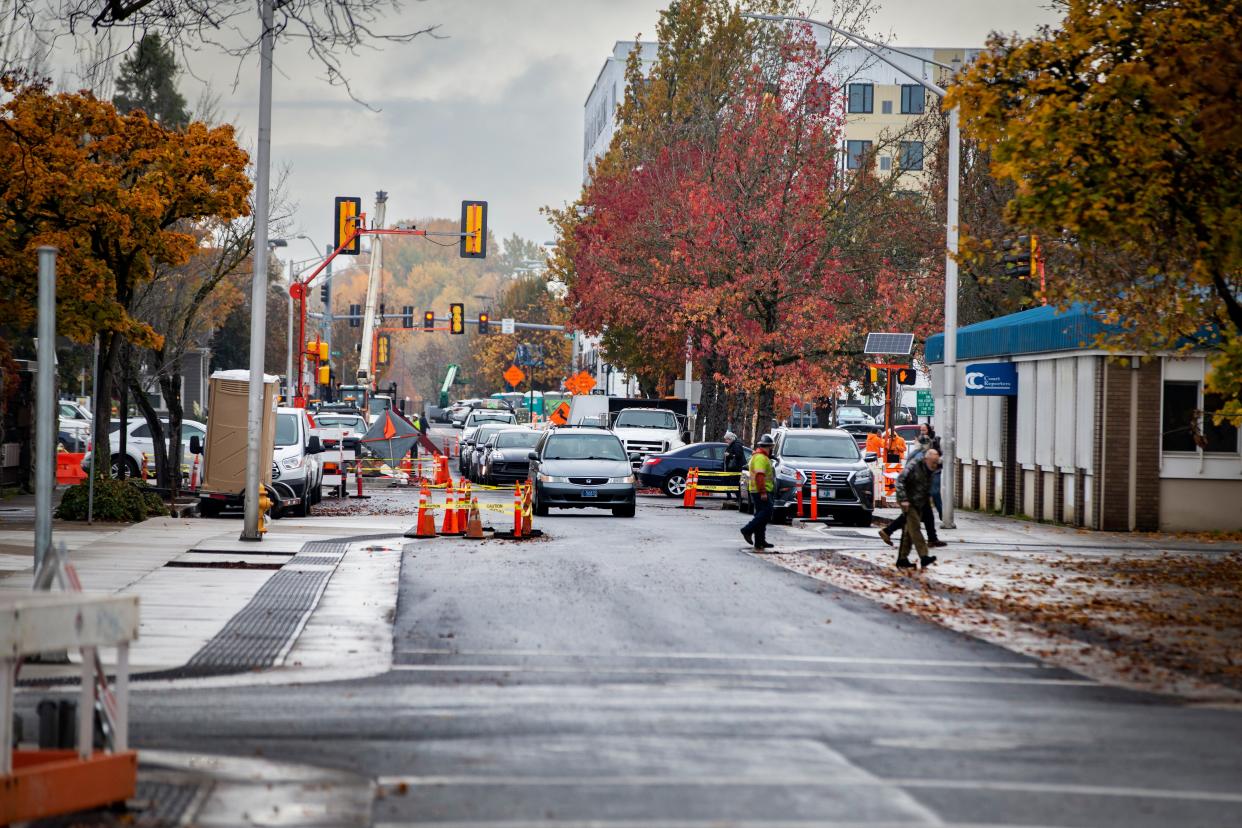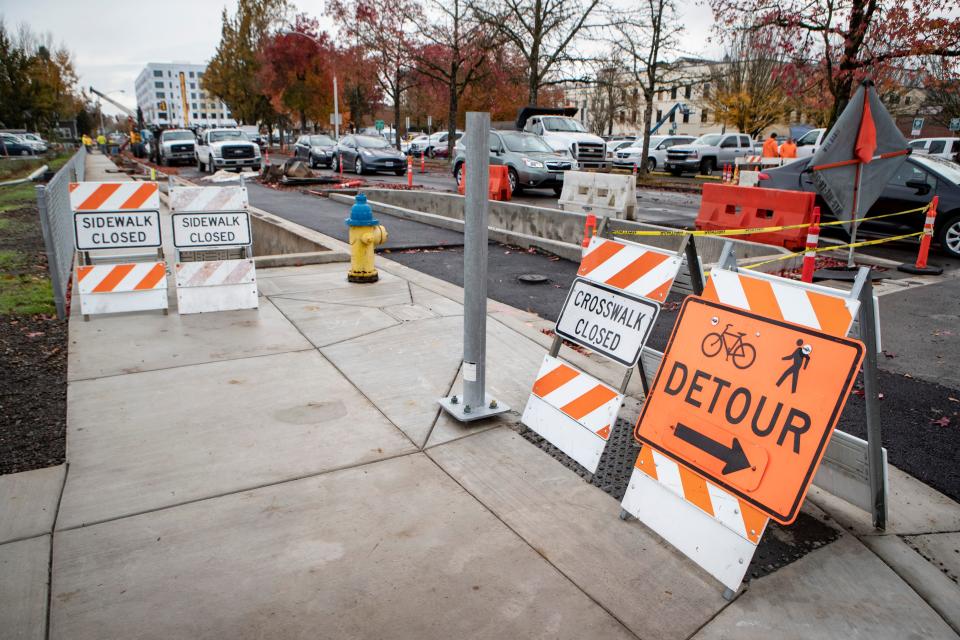Springfield City Council also adopt parking reform per climate-friendly state rules

This story was updated at 6:20 a.m. Tuesday, Nov. 21
The Springfield City Council unanimously adopted a ordinance removing its parking minimums on Monday night, but outlined "recommended" parking that the city would have previously required.
Original story
The Eugene City Council on Nov. 13 accepted a local ordinance that will remove a city-wide mandate on parking minimums required for homes and businesses.
This ordinance is a localized version of state-mandated parking reforms necessary to meet emission reduction goals and means the city will not require minimum amounts of off-street parking, instead prioritizing safe routes for public transportation, walking and biking over encouraging the use of cars with parking.
A state-wide adoption of Climate Friendly and Equitable Communities (CFEC) rules occurred in July 2022 following an executive order issued by former Gov. Kate Brown as a way to support Oregon meeting climate pollution reduction goals and policies.
The policies include goals to reduce air and water pollution, limit contributions to greenhouse gas emissions and transition to focus on clean fuel usage.
The CFEC initiatives mandate metropolitan areas across Oregon reform transportation and housing development standards to encourage more equitable outcomes for accessibility and to decrease transportation emissions.
The rules are not codified at the state level, meaning cities are interpreting these rules without them being made state law.
If the council had decided not to adopt an ordinance reforming parking, the state’s rules would automatically apply to the city on Jan. 1, prohibiting the requirement of off-street parking.
Assistant City Attorney Lauren Sommers said failure to adopt an ordinance would result in the same outcome of prohibiting off-street parking requirements, regardless of the council’s action or inaction.
“The ordinance that is before you is something that city staff conducted public engagement on, that staff have done a lot of work to kind of take the state law requirements and import them into our land use code in a way that works and fits with the city’s processes and land use processes,” Sommers said.
“If the ordinance is not adopted, although the outcome might be similar, we will lose that work that staff have done to create an ordinance that fits as well as it can locally within the bounds of the state requirements.”

Three parking reforms considered
The council’s parking reform decision, approved on a 4-3 vote, stemmed from three available options.
The first option presented was to remove city-wide minimums for off-street parking for new developments.
This option instills uniform rules across the city, allows for more flexibility in development and would impact new construction and redevelopment.
In the city council work session, sustainability commission chair Jan Bohman recommended adoption of option one, which would entail the removal of city-wide parking mandates and unbundle parking from housing. The ordinance as adopted does not unbundle parking from housing.
This was the option accepted by the council.
The second reform option called for the selection of more parking reform and management programs. The third option was to remove parking minimums for certain locations and uses.
Councilor Mike Clark opposed the ordinance, citing concerns about the state overstepping to mandate rules for cities in such a way.
“I hope that we would consider the role that Springfield has taken with their planning commission to say they’re going to actively provide recommendations of what they would normally have procedurally done and recommend it prior to CFEC when it comes to permitting something being built, especially commercial buildings,” Clark said. “I hope we consider that on our side of the highway, as well.”
Councilor Matt Keating said he also felt the automatic application of state rules was something worth issuing a protest vote of his own.
“This flies in the face of the thoughtful, deliberative debate we had just a year and a half ago about off-street parking as it relates to EMX and frequent transit lines,” Keating said. “Those are issues that crop up time and again in the south hills.”
Others have raised concerns that enactment of the initiatives to reduce transportation emissions may impact cities’ abilities to concurrently develop affordable housing — another goal of CFECs.
On Jan. 1, the Eugene eliminated minimum off-street parking requirements for smaller housing types, affordable housing, childcare facilities, publicly supported housing, shelters and for locations within one-half mile of frequent transit corridors.
By Dec. 31, newly constructed developments with more than ¼ acre of surface parking will have to abide by CFEC requirements by either installing solar panels or maintaining 50% of the lot space with tree canopy.
Climate-Friendly and Equitable Community initiative discussions
Discussion about CFEC initiatives and guidelines has been ongoing since Gov. Brown's executive order mandated adoption.
Springfield Mayor Sean VanGordon testified Oct. 27 before the Housing Production Advisory Council, encouraging a pause and delay on the implementation of CFEC rules.
VanGordon testified to the Eugene council on behalf of the League of Oregon Cities, which works with cities through the development of policies and legislation.
He said it is imperative to align CFEC rules and additional rules necessitated by the Oregon Housing Needs Analysis program as barriers to the development of affordable housing.
"We also want to be clear that our support for aligning these two initiatives is because we support the goals of CFEC and are doing our part to help the acceleration of housing production that our communities desperately need," he said.
"Our concern is that if the current process continues, these objectives will be delayed or impossible to achieve,” VanGordon said. “For Springfield, a 1,500 unit mixed-density development is at risk because CFEC would most likely trigger a transportation system plan update, potentially adding years to the project development and potentially restricting transportation options necessary to support our communities best.”
He called for alignment of CFEC and OHNA objectives to achieve the goals of both programs in a way that is accessible for cities, done in a timely manner and in a way that doesn’t increase costs.
Eugene is working to identify promising locations for Climate-Friendly Areas that will be selected in 2024 and will require revisions to the Land Use Code, the Envision Eugene Comprehensive Plan and the Eugene Transportation System Plan in order to be adopted. Adoption and code amendments would occur in 2026 when Eugene’s next Urban Growth Boundary analysis also is adopted.
With the newly adopted ordinance, Eugene has a localized version of state rules that accounts for public input and feedback, unlike the cookie-cutter implementation of CFEC rules that would go into effect in January if no action had been taken.
“The community engagement is important,” Mayor Lucy Vinis said of the localized ordinance. “You have an advisory board and a planning commission that went through a long and thoughtful process with staff and I think you do want to make the best out of what you’ve got.”
Hannarose McGuinness is The Register-Guard’s growth and development reporter. Contact her at 541-844-9859 or hmcguinness@registerguard.com
This article originally appeared on Register-Guard: Springfield, Eugene councils remove city mandates on parking minimums

